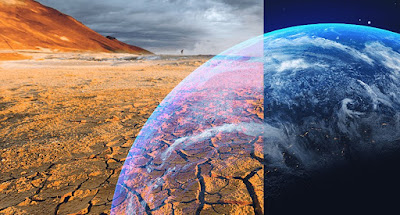The
summer of 2023 was the hottest season ever recorded on Earth, due to a
combination of factors, including:
Rising
global temperatures: The average global temperature has been increasing for
decades, due to human activities that release greenhouse gases into the
atmosphere. These gases trap heat, causing the planet to warm.
El
Niño: El Niño is a climate pattern that occurs every few years and causes
warmer-than-average temperatures in the Pacific Ocean. El Niño was present in
2023, which contributed to the overall warming trend.
Record-breaking
heat waves: There were several record-breaking heat waves in 2023, including
one in the U.S. Southwest that caused temperatures to reach 50 degrees Celsius
(122 degrees Fahrenheit). These heat waves were made more likely and intense by
climate change.
Melting
ice caps and glaciers: The melting of ice caps and glaciers is also
contributing to rising sea levels and global warming.
The
summer of 2023 was a wake-up call for the world about the dangers of climate
change. Scientists are warning that if we do not take action to reduce
greenhouse gas emissions, the planet will continue to warm, leading to more
extreme weather events and other negative consequences.
Addressing climate change
Reduce
our reliance on fossil fuels and switch to renewable energy sources.
Insulate
our homes and businesses to conserve energy.
Drive
less and walk, bike, or take public transportation more often.
Eat
less meat and more plant-based foods.
Support
businesses that are committed to sustainability.
By
taking these actions, we can help to reduce our impact on the planet and create
a more sustainable future.
A wake-up call
The
summer of 2023 was a wake-up call for the world about the dangers of climate
change. Scientists are warning that if we do not take action to reduce
greenhouse gas emissions, the planet will continue to warm, leading to more
extreme weather events and other negative consequences.
Here
are some other things that we can do to help address climate change:
Get
involved in climate action campaigns.
Educate
ourselves and others about climate change.
Lobby
our elected officials to take action on climate change.
Support
businesses and organizations that are working to address climate change.
By
taking these actions, we can help to create a more sustainable future for
ourselves and our planet.
?Is life
on earth in danger
Life on
Earth is in danger, but not necessarily in immediate danger of extinction.
However, the current rate of climate change is unprecedented in human history,
and it is causing a number of serious problems, including:
Rising
sea levels, which are threatening coastal communities and infrastructure.
More
extreme weather events, such as heat waves, droughts, floods, and wildfires.
Loss of
biodiversity, as many species are unable to adapt to the changing climate.
Spread
of diseases, as mosquitoes and other vectors are able to survive in warmer
temperatures.
These
problems are already having a significant impact on human health, security, and
economy. If we do not take action to reduce greenhouse gas emissions, the
problems will only get worse.
It is possible that life on Earth could go extinct if we do not take action to address climate change. However, it is more likely that life will continue, but in a much different form. Many species will go extinct, and the planet will become more hospitable to other species. Humans may also be forced to adapt to a changing climate, or even relocate to new areas.
The
future of life on Earth is uncertain, but it is up to us to decide what that
future will look
like. By taking action to reduce greenhouse gas emissions, we
can help to ensure that life on Earth can continue for many generations to
come.

